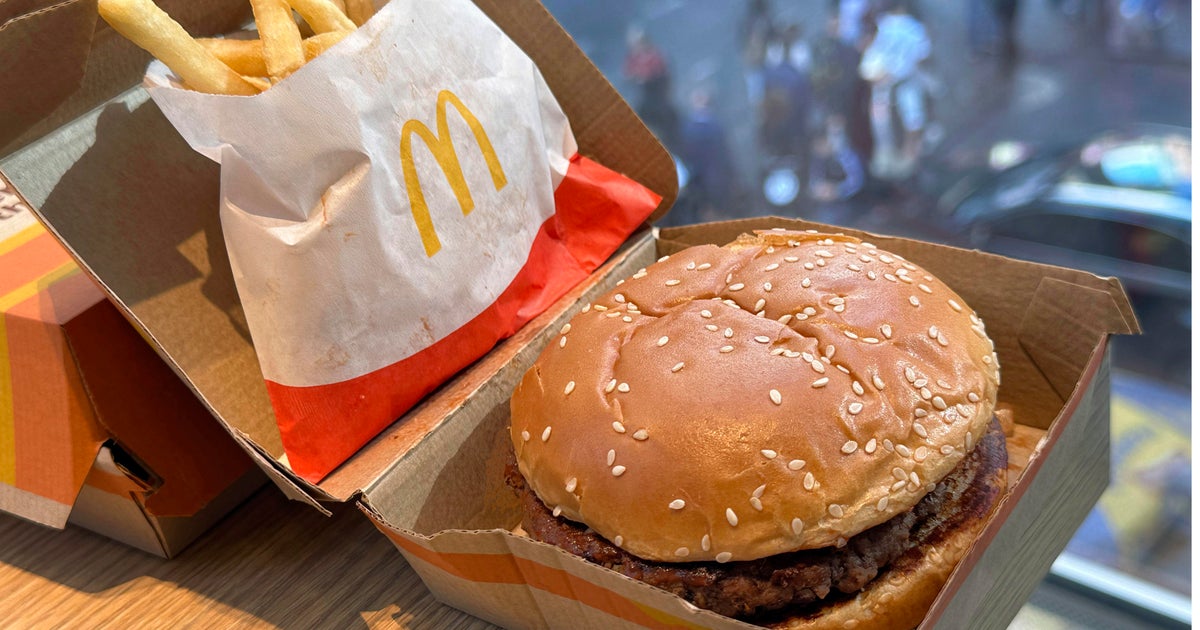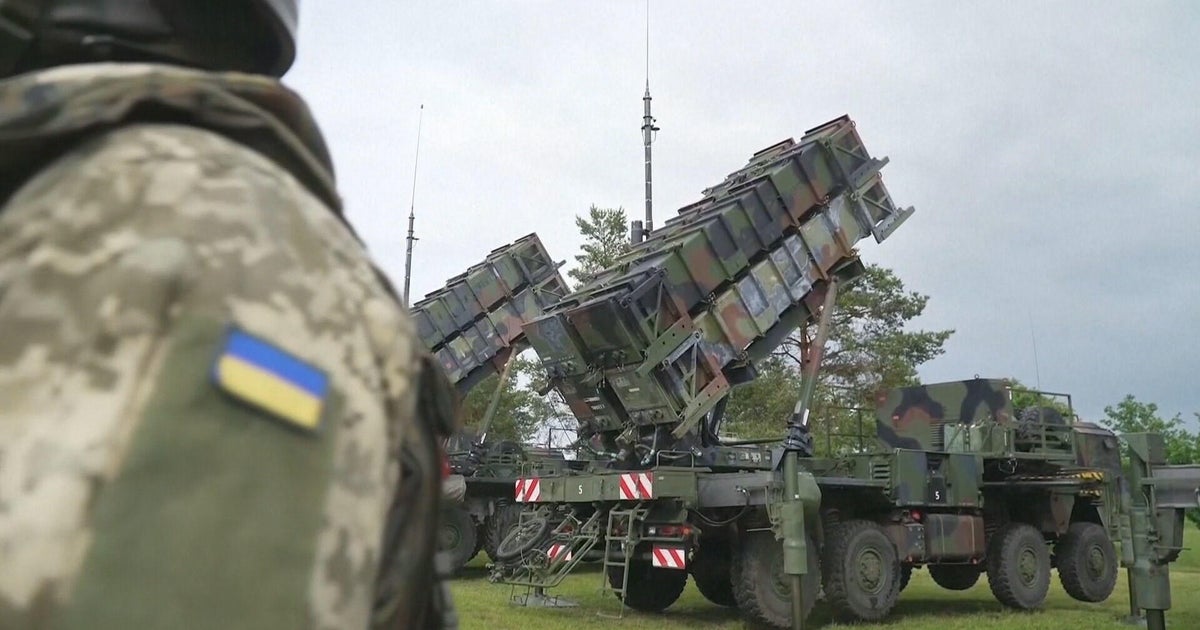CBS News
Russia works around sanctions designed to stifle the economy | 60 Minutes

When Russia invaded Ukraine it sparked international outrage. It also triggered a wave of international sanctions designed to cripple Russia’s economy so badly…it couldn’t fight the war.
And yet…two-and-a-half years later, the fighting continues and the International Monetary Fund predicts, this year, Russia’s economy will grow over 3%. More than the U.S. and Europe.
The architect behind the United States sanction strategy is Daleep Singh – the deputy national security advisor for international economics at the White House.
We first interviewed him in the weeks after the 2022 invasion…when he told us he expected a barrage of sanctions to bring Russia’s economy to its knees.
Earlier this month, we went to Washington to ask Daleep Singh about those early predictions of a nosedive.…and he told us something we don’t hear very often on 60 Minutes.
Daleep Singh: So let’s be– let’s be honest. This is not the nosedive that I predicted two years ago. But– I don’t think anybody should mistake Russia’s rebound with resilience. On the surface, Russia’s economy may appear to be a fortress, but underneath the foundations are fragile.
Hours after the invasion, the U.S. began striking that foundation.
At the White House, Daleep Singh announced the administration’s strategy…
60 Minutes
Within 72 hours, the U.S. and its allies…. blocked Russia’s central bank from accessing $300 billion it stashed around the world, then froze the foreign bank accounts of dozens of Russian billionaires …later, seizing their trophies for good measure.
Since then, 45 countries have directed over 5,000 sanctions at Russian targets… everything from diamonds and semiconductors to Vladimir Putin himself. And yet…
Sharyn Alfonsi: The war is still raging. The Russian economy is growing. It looks like sanctions have been a failure.
Daleep Singh: No, not at all so he’s turbo-charged government spending to fuel the war machine. He’s frozen infrastructure and education spending. And– yes, that’s lifted GDP growth. But there’s a cost. Sky-high inflation, almost 9%. Nosebleed interest rates, almost 19%. Both are choking off growth.
But the sanctions have not been able to curb the flow of cash from the Kremlin’s most valuable asset… oil. Russia is the third largest producer in the world…and this year, its oil and gas revenues are expected to increase 2.6% to nearly $240 billion.
We wondered how – despite all those sanctions- the Kremlin is still making so much money from its oil. We found the answer in an unexpected place.
Twenty miles off the coast of Greece.
We went there with Samir Madani….
Madani runs a company from Stockholm that tracks oil tankers for dozens of international clients…such as insurance companies or shippers…who want to know exactly where oil is moving in case of a spill or accident.
60 Minutes
But he took us to see this oil tanker…called the Sprite. It’s part of Russia’s “dark fleet” – one of an estimated 200 ships that move a million barrels of Russian oil around Western sanctions every day.
Madani and his team monitor satellite images, signals from ships, and photographs from the ground to track tankers.
He told us, one day, in January 2023, he noticed something suspicious on his dashboard…a tanker sending signals from a port in Japan…a country that doesn’t export crude oil.
Samir Madani: That didn’t make sense. So I was able to review that with satellite imagery and saw that there was no vessel at the port. Instead– it was a spoof where in fact we saw the vessel in Kozmino, in Russia.
Sharyn Alfonsi: So they’re able to lie about their location?
Samir Madani: Yes: in real time.
Sharyn Alfonsi: And so that allows them to move wherever they want to move–
Samir Madani: Absolutely.
Sharyn Alfonsi: –undetected.
Sharyn Alfonsi: And that happened how quickly after the sanctions took place?
Samir Madani: Immediately. Immediately.
Sharyn Alfonsi: When you’re sitting at your dashboard and you’re watching all of this, what makes you know that’s part of the dark fleet?
Samir Madani: Yeah. The ownership– will change, the vessel– age is beyond 15 years– that’s a red flag. And so these vessels were supposed to be scrapped. And then somebody makes a bid in the last minute, with a– with a million dollars, and gets to extend the life of this tanker.
The Sprite is one of those tankers. 21 years old, it was last purchased in February and is registered to a shell company in the Caribbean. So what was it doing floating off the coast of Greece?
Samir Madani: SPRITE here is acting as a dropbox for Russian oil. If you can see on her starboard side on the right side there you have the 4 buoys. And that means they placed those there for contact with other vessels.
60 Minutes
Other dark fleet vessels that will transfer oil onto or off of the Sprite…Madani spotted one of them, the Zambra, a mile away.
These are images Madani’s team provided of Zambra moving oil from Russian ports on the Black Sea through the Bosphorus Strait in Turkey and then transferring it onto the Sprite just off the coast of Greece.
Sharyn Alfonsi: We were there with you, we’re watching you know transfer, transfer, transfer. What’s going on there?
Samir Madani: The transfers are an additional layer of obfuscation when it comes to– transferring oil. So when you have a “floating dropbox” act like that, you know, where it’s able to take in any kind of oil, and then output any other kind of oil, it confuses things.
The point of this tanker shell game is to get around Western sanctions…specifically a price cap that was supposed to limit Moscow’s oil profits.
In 2022, the G-7, which includes the U.S., Canada, Japan, and four European countries…banned the import of Russian oil. But they didn’t want to risk a global price spike. So, they allowed Russian oil to continue to flow internationally but imposed a $60 a barrel price cap on the purchase of Russian crude oil.
Russia’s workarounds are paying off…. almost all of its crude oil is selling above the price cap. In the last two years, Russia’s dark fleet has moved an estimated $45 billion worth of crude oil.
Sharyn Alfonsi: And where is all that oil going?
Samir Madani: Yeah. Most of the oil that– departs Russia by sea– nowadays is going to China and India.
60 Minutes analyzed four years of data from India’s Ministry of Commerce. We found the value of India’s imports of Russian crude oil increased by more than 2,000% since the invasion of Ukraine.
Much of that crude goes to an Indian port called Sikka…where it is refined into other oil products, such as gasoline. But those products don’t necessarily stay in India.
Sam Madani helped us track a tanker of “refined products” from India’s port … around the tip of Africa …across the Atlantic Ocean…and ultimately, here …to New York.
Sharyn Alfonsi: We saw the ship coming from India into the New York Harbor. How often is that happening?
Samir Madani: It happens around– twice a month, and they bring in around half a million barrels of refined product. Fuel.
Sharyn Alfonsi: So, is the Russian crude oil untraceable?
Samir Madani: After it becomes refined it’s untraceable. Yeah.
The U.S. Treasury has sanctioned 38 Russian “dark fleet” tankers… but Sam Madani says he’s identified 170 others that are still active, moving Russian oil.
Sharyn Alfonsi: They’re not doing it in the middle of the night. They’re doing it in broad daylight. How do you stop that?
Daleep Singh: First, identify them. Second, let them know– that– they’re subject to our sanctions. And then, three, deliver those sanctions. Any player in Russia’s shadow fleet network would be subject to our sanctions.
Sharyn Alfonsi: Why not do it right now?
Daleep Singh: What we’re trying to balance right now is– is to continue to move the global oil market into balance, to continue to have– a downward movement in the level of inflation across the world, and to sustain unity. We can’t sanction Russia’s shadow fleet by ourselves: so, there’s a diplomatic component to this too. This is about stamina more so than it is about shock and awe.
There’s another market the U.S. is trying to keep in balance – American nuclear energy.
The U.S. is still paying Russia $1 billion a year for enriched uranium to help fuel 94 nuclear reactors that provide about a fifth of America’s energy needs.
In May, Congress took notice and banned the import of Russian-enriched uranium. But the ban won’t go into full effect for four years.
Sharyn Alfonsi: Does the U.S. have the capacity right now that it needs for enriched uranium?
Amir Vexler: No. So un– unfortunately– about 25% of it to 30% has been imported from Russia.
60 Minutes
Sharyn Alfonsi: We don’t have it.
Amir Vexler: Right. We– we are dependent.
That’s because the United States stopped making enriched uranium a decade ago. Amir Vexler runs Centrus Energy.
Last year, Centrus began enriching uranium inside this Piketon, Ohio facility. The only American company with that capability.
Vexler showed us how it’s done — those 40-foot-tall centrifuges spin uranium gas until it’s enriched and can be used as nuclear fuel.
But these 16 centrifuges can only make a fraction of the enriched uranium the U.S. needs. See those squares…on the ground? Those are placeholders for 11 thousand more centrifuges Centrus wants to build.
Sharyn Alfonsi: And how long in the best-case scenario would it take to get those up and running?
Amir Vexler: It will take about six to seven years to get to full capacity.
Sharyn Alfonsi: And to not be reliant on Russia.
Amir Vexler: That is correct.
In Russia, businesses quickly pivoted. When Western companies left the country at the start of the war, Russian versions replaced them. Starbucks with Stars Coffee…Zara with Maag. Coca Cola …Dobry Cola. even authentic Western products– such as the latest iPhones are still getting into the hands of Russians.
Sharyn Alfonsi: When we first started hearing about sanctions against Russia, we anticipated seeing, you know, bread lines in Moscow. Has that happened?
60 Minutes
Richard Connolly: In a word, no. The most goods that Russians would have accessed before the war are available now.
Richard Connolly is an associate fellow at the Royal United Services Institute in London and a specialist on the Russian economy.
Richard Connolly: Sanctions prohibit the sale of western cars to Russia, Mercedes or Chryslers. But a lot of them are still making their way to Russia via third parties, like Georgia and the South Caucasus, or Kazakhstan, or China. Now, of course, if you’re gonna have to send an American or German car on this roundabout route to reach Russia, the price of that car when it’s sold is much higher than it was before the war. But, a lot of Russians with a lot of money in their pocket who are prepared to pay that higher price. There’s an incentive for lots of Russian small businesses to acquire goods on foreign markets from sanctioning countries, bring them back to Russia, and sell them at a very healthy markup.
Sharyn Alfonsi: So evading sanctions has become good business in Russia–
Richard Connolly: It’s become a business– sector of its own in Russia, yes.
Sharyn Alfonsi: What kind of businesses are we talking about?
Richard Connolly: Some people are selling goods that were previously sanctioned. They’re producing them at home. The number of small- and medium-sized businesses registered in Russia is at an all-time high. Before the war Russia had a big problem. It wasn’t investing enough. But since the war began the single biggest source of investment is in trade and logistics.
Sharyn Alfonsi: It almost sounds like, from an economic perspective, that the war’s the best thing that’s happened to Russia.
Richard Connolly: It certainly changed the economic trajectory. This is the fastest it’s grown for a consecutive period in over a decade and a half. Whether they can sustain that over time is, of course– the big question. It’s possible they may confound expectations in the future as well.
Produced by Lucy Hatcher. Associate producer, Erin DuCharme. Edited by Robert Zimet.
CBS News
McDonald’s beef patties test negative for E. coli in Colorado, Department of Agriculture says

Colorado has seemingly eliminated one ingredient as a cause for death and illness, as states continue to investigate the source of an E. coli outbreak involving the Quarter Pounder hamburger at dozens of McDonald’s locations. As a result, the Quarter Pounder will begin to return to certain locations.
The Colorado Department of Agriculture announced McDonald’s brand “fresh and frozen beef patties” tested negative for E. coli after its lab analyzed dozens of subsamples.
CDA says it has completed all beef testing and does not anticipate receiving further samples.
Meanwhile, the federal investigation into the deadly E. coli outbreak in Colorado has focused on ground beef patties and onions. There continues to be no evidence that onions grown in Colorado are linked to the outbreak.
According to McDonald’s, The 900 restaurants that historically received slivered onions from Taylor Farms’ Colorado Springs facility will resume sales of Quarter Pounders without slivered onions. Those restaurants are in Colorado, Kansas, and Wyoming, as well as portions of Idaho, Iowa, Missouri, Montana, Nebraska, Nevada, New Mexico, Oklahoma and Utah. The restaurant chain also noted it has stopped getting onions from that facility indefinitely.
“The issue appears to be contained to a particular ingredient and geography, and we remain very confident that any contaminated product related to this outbreak has been removed from our supply chain and is out of all McDonald’s restaurants,” McDonald’s North American Chief Supply Chain Officer Cesar Piña said in a statement Sunday
Since the outbreak was first announced, CBS News Colorado confirmed one older man on the Western Slope died after consuming a Quarter Pounder from a McDonald’s location in the state. Initial information also confirmed more than two dozen people had become ill due to E. coli-affected Quarter Pounders.
Nationwide, this outbreak has sickened 75 people in more than a dozen states, but Colorado remains the only state impacted that has experienced a death due to it.
The Colorado Department of Public Health says there have been 26 cases reported in nine different Colorado counties, and they are located in several different parts of the state:
- Arapahoe County
- Chaffee County
- El Paso County
- Gunnison County
- Larimer County
- Mesa County
- Routt County
- Teller County
- Weld County
The illnesses were reported between the last days of September and through Oct. 11. An investigation by the Centers for Disease Control and Prevention into the outbreak is ongoing.
McDonald’s company leaders previously said they’ve taken Quarter Pounders off the menu in states where there have been outbreaks.
CBS News
“CBS Weekend News” headlines for Sunday, Oct. 27, 2024

Watch CBS News
Be the first to know
Get browser notifications for breaking news, live events, and exclusive reporting.
CBS News
Harris campaigns in Philadelphia as Trump rallies in New York City

Watch CBS News
Be the first to know
Get browser notifications for breaking news, live events, and exclusive reporting.













